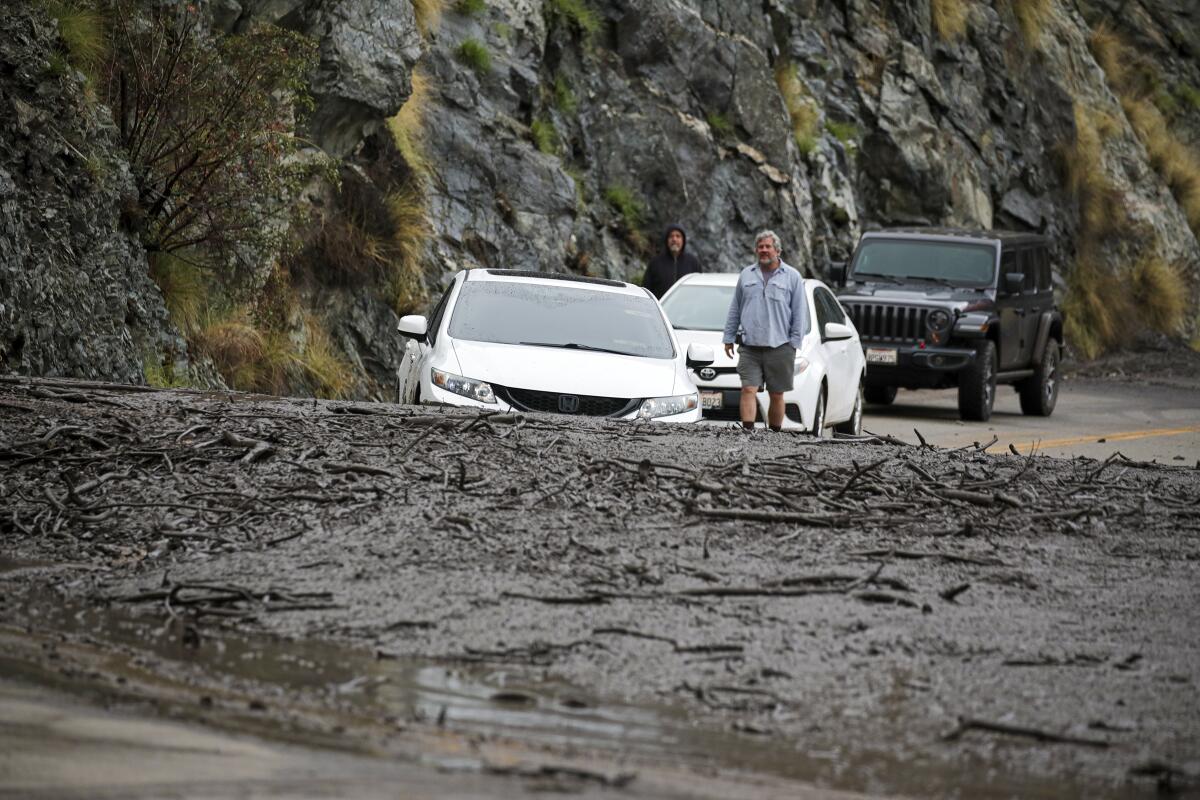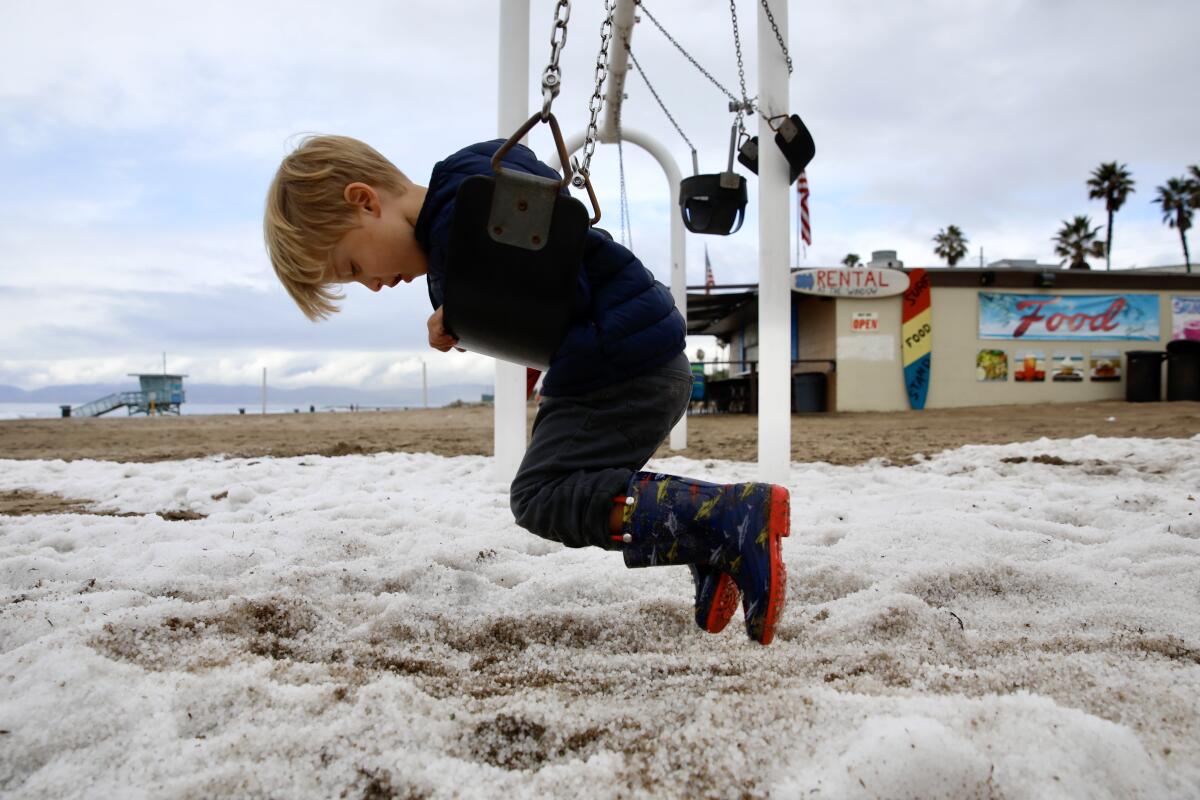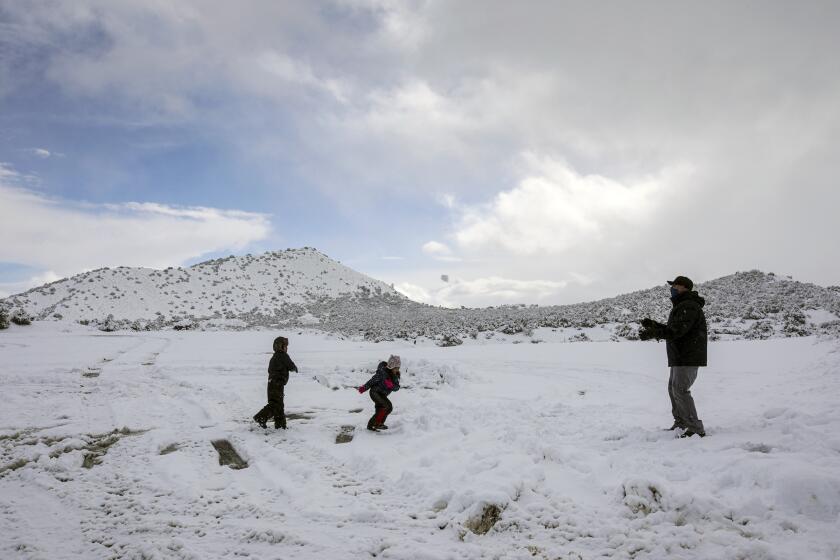Winter storm triggers mudslides, clogs roadways in Southern California

- Share via
Heavy rain from a winter storm system pounded Southern California on Friday, triggering car accidents, road closures, mudslides and lightning flashes that temporarily closed L.A. County beaches.
There was moderate mud and debris flow near the area burned last year by the Bond fire, which scorched over 6,000 acres in Orange County, destroying vegetation and causing the soil to destabilize.
As of late Friday, there were no reports of damage to homes or any related injuries, said Carrie Braun, a spokeswoman for the Orange County Sheriff’s Department.
Authorities issued voluntary evacuation warnings for those living in Silverado, Williams and Modjeska canyons that were still in place Friday evening. The National Weather Service had broadcast a flash flood watch for those areas through Friday afternoon, but the weather service said with the storm moving toward San Diego, the threat of flooding had diminished.
A winter storm swept over much of Southern California, dusting mountaintops with snow and bringing traffic to a standstill on several passes.
San Luis Obispo and Santa Barbara counties bore the brunt of the atmospheric river system, receiving between 6 and 12 inches of rain Wednesday and Thursday, said Curt Kaplan, a meteorologist at the National Weather Service office in Oxnard.
“Once the atmospheric river started moving south, it lost a little bit of its punch,” he said.
Thirty miles north of the San Luis Obispo County line, the atmospheric river stalled Thursday afternoon, causing a section of Highway 1 near Big Sur to collapse. It was unclear how long it will take to fix the roadway. Repairs are expected to cost $5 million.
The San Bernardino County Sheriff’s Department had issued an evacuation order Thursday for people who lived in northeast Yucaipa and in the communities of Oak Glen and Mountain Home Village, areas near where the El Dorado and Apple fires burned last year. Fire authorities had worried that heavy rain could dislodge soils left weakened by the fires, potentially causing dangerous mudslides. San Bernardino authorities downgraded those evacuation orders to warnings Friday.
Riverside County had also issued an evacuation order Thursday, anticipating the threat of mudslides in burn areas. The order extended to people who lived in parts of Beaumont and Cherry Valley, just east of Banning in the foothills of the San Bernardino Mountains. The county lifted the evacuation order at 5 p.m. Friday.
Hail was reported near Azusa along the 210 Freeway and near the Ranch 2 fire burn area, the weather service said. The mountains in Los Angeles County were expected to get between 1 and 2 feet of snow above 6,000 feet Friday by the time the storm finally moved out.
“We initially thought we would see 3 feet of snow but didn’t get as much rain in the mountains as we expected,” Kaplan said.
The Los Angeles County Fire Department temporarily closed beaches from Marina del Rey to Zuma Beach on Friday afternoon because of the threat of lightning. In Orange County, Huntington Beach issued a voluntary evacuation order of all beaches in the city through 5 p.m. because of lightning.

About 11 a.m., a strong storm cell produced heavy rain and some hail over East Los Angeles, the weather service wrote on Twitter. There were also reports of hail in parts of Manhattan Beach.
Orange County received around an inch of rain, and up to 1.5 inches in the hills, between 10 p.m. Thursday and 1 a.m. Friday, said Bruno Rodriguez, a meteorologist for the National Weather Service in San Diego.
The Inland Empire received between .75 and 1.25 inches of rain in urban areas. Nearby mountains got about a foot of snow around 4,000 feet, Rodriguez said.
The rain also triggered mud and debris flows near the Bobcat burn scar in the Angeles National Forest, Kaplan said. Much of that area was warned of possible evacuation Thursday by the Los Angeles County Sheriff’s Department.
Though the 5 Freeway through the Grapevine was open Thursday, snow flurries sticking to the roadway prompted California Highway Patrol to escort traffic Friday morning.
In Los Angeles, an overturned big rig and fire prompted the closure of three lanes of the eastbound 10 Freeway at Santa Fe Avenue to allow crews to repair the bridge railing. Lanes reopened about 11 a.m. Friday.
State Route 39 at Old San Gabriel Canyon Road was temporarily closed because of mudslides nearby, authorities said. A portion of Route 33 remained closed late Friday after 1 foot of snow fell in Lockwood Valley.
The rainfall last Sunday night caused mud to slide onto Ambrose Jimenez’s property in Silverado Canyon.
Jimenez, 63, didn’t realize what had happened until Monday morning, when he tried opening his screen door only to find a foot of mud trapping it.
“I had no idea the mud was creeping in all night long,” he said. “Mud just came down toward our kitchen wall, around the house and on the sides.”
Between Monday and Thursday, Jimenez worked with a friend to clear his property. They used a wheelbarrow to move the mud and installed 35 bales of hay and 755 sandbags to create a barrier to guide the mud away from the house into an empty lot next door, he said.
“We angled the mud from the gully [near my house] to an empty lot next door with the hay bales and sand,” he said.
The work continued from Monday until Thursday at 5 p.m., just hours before the new storm arrived.
“We knew the storm was coming. We worked frantically trying to shore up the back hillside,” Jimenez, a fraud investigator for Citibank, said.
About 9:20 p.m., Jimenez first heard the rainfall. By 1 a.m. Friday, the storm intensified.
“I heard rocks coming down and I thought to myself, oh no, we’re in trouble,” he said.
Jimenez saw 3 to 5 feet of mud accumulating within five minutes on the hill behind his house. Then, “instantly, it was like someone uncorked a champagne bottle,” he said.
The mud turned to water and flushed through his property.
“All we have to deal with was water,” he said. “We can deal with that. It’s the mud and the debris that’s a problem.”
“We are lucky,” Jimenez said. “We have neighbors who are not so lucky.”
More to Read
Sign up for Essential California
The most important California stories and recommendations in your inbox every morning.
You may occasionally receive promotional content from the Los Angeles Times.















